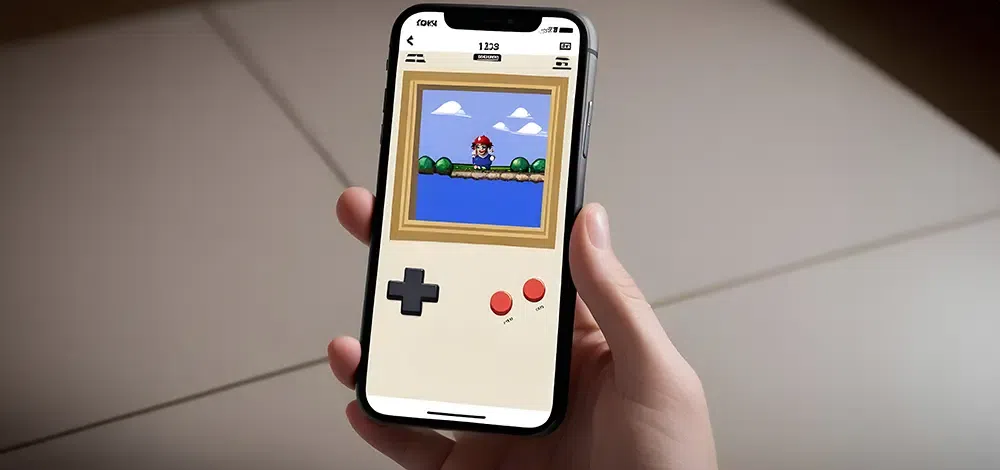The iPhone’s App Store has reached a significant milestone with the introduction of its first Apple-approved emulators, most notably iGBA, allowing users to relive Game Boy Advance (GBA) classics on their iOS devices. This development has thrilled retro gaming enthusiasts, who can now experience their favorite childhood games on modern platforms without needing to jailbreak their devices. However, amid the excitement, controversy brews as suspicions arise regarding the origin of iGBA’s code, casting a shadow over the emulator’s debut.
The Introduction of iGBA and Its Capabilities
Developed by Mattia La Spina, iGBA quickly garnered attention for its impressive emulation capabilities. The app enables iPhone users to play GBA titles seamlessly, delivering a near-console-like experience directly on iOS devices. This functionality, long requested by Apple users, marks a turning point in Apple’s traditionally restrictive approach to software, especially when it comes to emulators that can run games designed for older consoles.
Emulators have always been a popular option for retro gaming fans, as they allow users to experience games from older platforms like Game Boy Advance, SNES, and Commodore 64. For years, Apple had a strict stance against allowing emulation software on the App Store, forcing users to look to third-party sources or jailbreak their devices. Now, with the arrival of Apple-approved emulators like iGBA, this restriction appears to be loosening.
Controversy Surrounding iGBA: Allegations of Code Plagiarism
While the arrival of iGBA is a win for iOS users, it didn’t take long for controversy to arise. Shortly after its release, developer Riley Testut, known for his work on GBA4iOS, an open-source emulator, accused iGBA of being an unauthorized clone of his work. GBA4iOS, which has long been a fan-favorite emulator for GBA games, provided the foundation for much of what iGBA offers today.
In a statement made to The Verge, Testut expressed his disappointment, suggesting that iGBA’s code bears a striking resemblance to GBA4iOS. He argued that the app may have borrowed significant portions of his work without proper attribution or authorization. This accusation of code plagiarism highlights ongoing issues within the app development community regarding intellectual property rights and the ethics of reusing open-source code in commercial applications.
Testut also pointed out that while iGBA was approved by Apple for the App Store, his own emulator, GBA4iOS, has been repeatedly rejected due to Apple’s strict policies against emulators in the past. Testut is currently focused on his alternative app marketplace, AltStore, which allows users to sideload apps on their iOS devices without needing to rely on Apple’s approval. AltStore’s flagship app, Delta, is an emulator that supports multiple systems, including GBA and Nintendo DS games, offering a legitimate alternative for users seeking to run emulators on their iPhones.
Privacy Concerns Over iGBA’s App Store Presence
Adding another layer to the controversy, iGBA has come under scrutiny for potential privacy issues. The app’s listing on the App Store reportedly indicates that it collects data that could identify users, including location data and device identifiers. This has raised red flags among privacy advocates, who argue that apps like iGBA should adhere to the same stringent privacy regulations as other apps on the App Store.
In response to these concerns, La Spina has addressed the allegations, stating that data collection is necessary for app functionality but ensuring that all data is handled securely and in compliance with Apple’s privacy policies. Nevertheless, the questions surrounding iGBA’s privacy practices remain a point of contention, especially in light of growing public awareness about digital privacy and data protection.
Privacy issues have become a hot-button topic, particularly as emulators like iGBA gain more visibility on platforms like the App Store. While the app may offer a thrilling gaming experience, users should be cautious about the potential risks associated with downloading emulation software, especially those that collect sensitive user data.
Broader Shift: Emulators Like Emu64 XL Enter the App Store
iGBA is not the only emulator to make its way to the App Store. Alongside it, Emu64 XL, a Commodore 64 emulator, has also surfaced, signaling a broader shift in Apple’s stance towards emulation software. The inclusion of such apps in the App Store marks a departure from Apple’s traditional rejection of emulators, which were previously only accessible through unofficial channels or alternative app marketplaces like AltStore.
Emu64 XL enables users to experience classic Commodore 64 games, further broadening the retro gaming options available to iOS users. However, similar to iGBA, reports have surfaced regarding the app’s privacy policies and the presence of extensive tracker consent forms, which has raised concerns among users. It appears that while Apple is relaxing its rules around emulation software, the apps making it to the platform may come with certain caveats.
The approval of these emulators has prompted questions about whether Apple is planning to adjust its broader app policies, especially in light of regulatory pressures and legal challenges. As more apps like iGBA and Emu64 XL find their way into the App Store, users will need to weigh the benefits of access to retro games against the potential risks tied to privacy concerns.
The Legal and Ethical Implications
The controversy surrounding iGBA’s launch underscores the complexities of balancing innovation with ethical app development practices. While iGBA’s arrival is a significant moment for Apple and its users, the accusations of plagiarism and potential privacy risks remind us that there are still unresolved legal and ethical issues within the app development community.
As Apple continues to face increasing scrutiny over its control of the App Store and its app approval policies, the emergence of emulators adds another layer to the ongoing debate. Developers like Riley Testut, who feel their work has been unfairly used or rejected by Apple, represent a growing movement advocating for more open and fair access to app distribution. Meanwhile, the introduction of privacy-sensitive apps highlights the need for better safeguards and transparency when it comes to user data.
Conclusion: A Milestone Marked by Challenges
The emergence of iGBA and other emulators on the App Store represents a notable shift in Apple’s approach to app approval, opening the door for more retro gaming options on iOS devices. However, the controversy surrounding iGBA, from allegations of code plagiarism to concerns about privacy, demonstrates the challenges that come with balancing innovation with ethical app development.
As emulators gain traction on the App Store, Apple will need to carefully navigate these complexities while ensuring that user privacy is protected and that developers’ intellectual property rights are respected. For users, the arrival of iGBA offers an exciting opportunity to relive childhood favorites, but it also serves as a reminder to stay vigilant about the apps they download.
For those seeking the latest in mobile gaming, check out the best camera smartphones to capture and enhance your gaming experiences. And for the most innovative apps, discover more at JW7 online platforms, where gaming and technology intersect.


